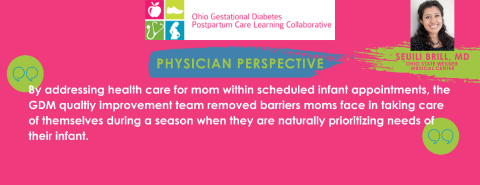
The following is a guest column from Ohio Colleges of Medicine Government Resource Center Medical Director Dr. Gil Liu.
Outpatient care is starting to feel more routine, but the strains of the pandemic are hardly over. As health care exits a crisis with so much trauma and tension, more than ever health care providers need ways to renew energies, calm our anxieties, and capably serve based on our own well-being. Further, we will need to continue to manage major seas of change. One change-management skill that is not nearly practiced enough: the celebrating of achievements and gratitude for those whose hard work contributed to meeting goals and winning the contest of quality improvement (QI).
As a medical director for the GRC, I have the privilege of working in several QI teams. Our efforts to increase evidence-based practice, improve patient experiences, reduce health disparities, optimize health care costs, and generate better health outcomes follow well-established quality improvement playbooks. In addition to practicing rigorous methods, conducting QI in health care settings requires substantial time, effort, patience and grit from brave champions.
Unfortunately, the hard work and hard-won victories don’t reliably receive well-deserved parties, medals, media attention, salary raises or other celebrations and accolades. Given that our health care system needs significant and continuing quality improvement, how should we help QI participants and stakeholders explore, experience, and recall moments of celebration?
For QI to work, there must be consistent applauding of QI accomplishment that reinforces commitment to continually getting better so that patients can get healthier.
Take, for example, the success of the Ohio Gestational Diabetes Quality Improvement Dyad team:
The Ohio Gestational Diabetes Quality Improvement Dyad team engaged mothers by merging well-child visit with postpartum GDM care. By combining visits, this model capitalized on mom’s initiative to seek care for her baby, allowed the physician to provide the care that both mother and their infant needed, and reduced traveling to clinics for families. While at the office for the baby’s visit, mothers impacted by GDM received postpartum care, including Type 2 Diabetes Mellitus (T2DM) testing and a diabetes prevention care plan. They also received education on the importance of T2DM screening and the long-term impact GDM has on both their health and the health of their child.
We compared the outcomes for program participants versus a matched comparison group, and the results are something to celebrate!
- Though almost all program participants (95.0%) completed a postpartum visit while in the program, only about 58.1% of women in the matched comparison completed a postpartum visit during the same period.
- Likewise, about 87.1% of program participants received a T2DM screen, compared to about 79.0% of women in the comparison group. Fewer women who participated in the program experienced new T2DM diagnoses (17.6%) than those in the comparison group (29.0%). Among program participants, there was better recognition of prediabetes diagnoses (12.9%) than those comparison group (6.45%). All differences were statistically significant.
These findings suggest that women who participated in the dyad program were more likely to obtain diabetes screens and attend postpartum visits than those who adhered to more usual patterns of care, and that these services may have resulted in increased detection of prediabetes.
Cause for applause!
But, it’s not as much the GDM QI program design that improved care as it is the people, like Dr. Brill and the team at Ohio State Internal Medicine and Pediatrics Grandview. The individual commitment of health care providers and practitioners at all levels is what makes quality improvement programs successful, and that’s reason enough in itself to celebrate.
And, it makes sense to celebrate people, especially in health care. After all, that’s usually what brings individuals into health care careers— a passion to connect with and help others. In a time when health care providers are experiencing more burnout, celebrating the QI team and aims may also build resilience, leading to higher levels of overall life satisfaction and well-being.
Celebrations help us build relationships and offer group forums for demonstrating generosity and compassion. When co-workers celebrate together, it leads to increased collaboration and social connection.
So I’d like to celebrate your QI accomplishments! Please let me know of stories and accomplishments that we can celebrate together. I always welcome an opportunity to forge a personal connection by meeting up to share a story or two about an encouraging QI victory.
If the opportunity arises to capture your team’s success in a quick letter or story, I’d love to work with you to formally acknowledge your work and celebrate your success in working to improve the health outcomes of Ohioans who turn to us for quality care that can save and improve lives.
Dr. Gilbert Liu, MD, MS is the medical director of the Ohio Colleges of Medicine Government Resource Center and a practicing pediatrician for more than 25 years.
